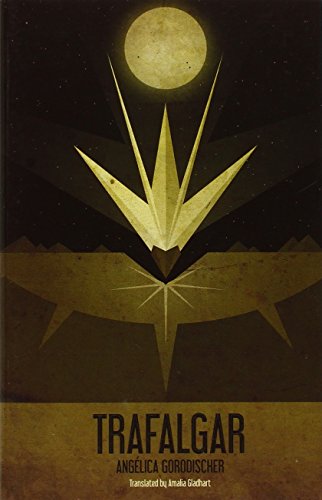 Small presses have their niche, The Atlantic tells us. As big publishers gamble on potential best-sellers, small presses fill the gap with obscure literary books. (Well, sometimes they are literary.)
Small presses have their niche, The Atlantic tells us. As big publishers gamble on potential best-sellers, small presses fill the gap with obscure literary books. (Well, sometimes they are literary.)
One such niche publisher is Small Beer Press, founded by writer Kelly Link (Get in Trouble) and her husband Gavin Grant. Small Beer publishes science fiction and fantasy: in addition to short stories by Ursula K. Le Guin, Joan Aiken, and Karen Joy Fowler, they published Sofia Samatar’s first novel, A Stranger in Olondria, which won the British Fantasy Award and the World Fantasy Award in 2014.
I learned about the Argentine science fiction writer Angelica Gorodischer (published in translation by Small Beer) from Jo Walton’s remarkable book about rereading SF, What Makes This Book So Great. She understands the difficulty of translation. She writes,
There’s one way around the problem of clunky translation and that’s having a world-class English stylist do the translating for you. It doesn’t happen often, but we’re lucky it ever happens. Ursula K. Le Guin’s translation of Angelica Gorodischer’s Kalpa Imperial is wonderful.
Le Guin’s translation of Gorodischer’s Kalpa Imperial: The Story of an Empire That Never Was is surely a classic in any genre. First published in 1983 in Argentina, it is a strange, often surreal collection of legends and a history of an imaginary empire that spans thousands of years. It is like being on a trip guided by Calvino, Herodotus, and Le Guin herself.
I expected to enjoy Gorodischer’s Trafalgar, also published by Small Beer Press, a collection of tales told by the eccentric hero, Trafalgar Medrano, who claims to have traveled to unknown planets in distant solar systems.
The slangy short sentences in Amalia Gladhart’s translation are completely unlike the baroque web of words we find in Kalpa Imperial. I missed the poeticism. Well, style isn’t everything. The book opens cleverly with a two-page Who’s Who entry about Trafalgar, an affluent doctor’s son who did not pursue medicine as his parents hoped, but rather has become a rich successful interplanetary businessman, or so he claims in his tall tales. The ten stories are told in easygoing dialogues between the narrator, a prosperous lawyer, and Trafalgar. Trafalgar is a coffee fiend–he drinks endless cups of coffee during their chitchat at the Burgundy bar–but mainly tells his latest stories of travel to distant planets. The narrator frequently interrupts with questions or sarcastic comments: “The what did you say?” or “That’s it how? They wrote a whole history book for that stupid little story?”
My question is, Are those questions English?
The first tale, “By the Light of the Chaste Electronic Moon,” is one of my favorites. On the planet Veroboa, which is run by an “aristomatriarchy” of a thousand women, or at least female-like people, Trafalgar makes the mistake of selling comic books (well, he didn’t know they were illegal). The events on the planet itself proceed rather like a comic book story. He is summoned by the governor, who is blonde, “with a pair of legs that if you saw them, you’d have an attack,” and she rebukes him for the comics.
He adds,
“There’s no need to recite the whole conversation. Besides, I don’t remember it. Those witches had executed the poor guy who tried to sell my comic books,” he drank a little more coffee, “and they had confiscated the material and decided I was a delinquent.”
He learns he must be interviewed by another member of the Central Government, the Enlightened and Chaste Lady Guinivera Lapis Lazuli. She keeps canceling appointments, and he is forbidden to leave the hotel, but finally he gets fed up and bribes a waiter to give him her home address. He finds her naked in bed in her hideous marble palace, staring at him with desire, so he gets into bed and they have fabulous sex: she keeps calling him Mandrake. It turns outs she hooked up to a virtual sex machine, which Trafalgar switched off, not knowing what it was, and when she realizes she is in bed with an actual man instead of fantasy Mandrake, she goes berserk.
In “The González Family’s Fight for a Better World,” he visits the planet Gonzwaledworkamen-jkaleidos (called Gonzalez for short). It turns out the undead rule the planet: While Trafalgar is having sex with his temporary landlady, her dead husband shows up to pick a fight. The dead aren’t buried, because they won’t stay dead, and they are more annoying than anything. Trafalgar schemes a way to keep them dead.
I also enjoyed “Constanza,” in which a lone queenly woman (who reminds Trafalgar of Nefertiti) is hiding in the ruins of a bleak planet, armed and ready to shoot to kill. She tells two tales of who she is: like Trafalgar, she may or may not be telling the truth. A very strange story.
This collection of stories is not quite for me. The content is sometimes amusing, but I found Gladhart’s translation very awkward. I am, however, looking forward to reading Gorodischer’s Prodigies, a novel translated by Sue Burke. How fascianting that three different translators were hired to translate Gorodischer’s books.

I’m intrigued by this one Kat – particularly as you mention Calvino! But it is a shame that the translation lets it down and I am inclined to think I would like the one translated by LeGuin!
LikeLike
I loved Kalpa Imperial! Trafalgar has its points, but it wasn’t quite for me.
LikeLiked by 1 person
I got Kalpa Imperial in an e-book bundle from Small Beer. I must get around to reading it soon!
LikeLike
It’s one of the best books I’ve ever read. I’ll have to check our the bundle!
LikeLiked by 1 person
No longer available, alas. : (
LikeLike